Unit 1 Great Scientists 教学设计
文档属性
| 名称 | Unit 1 Great Scientists 教学设计 | 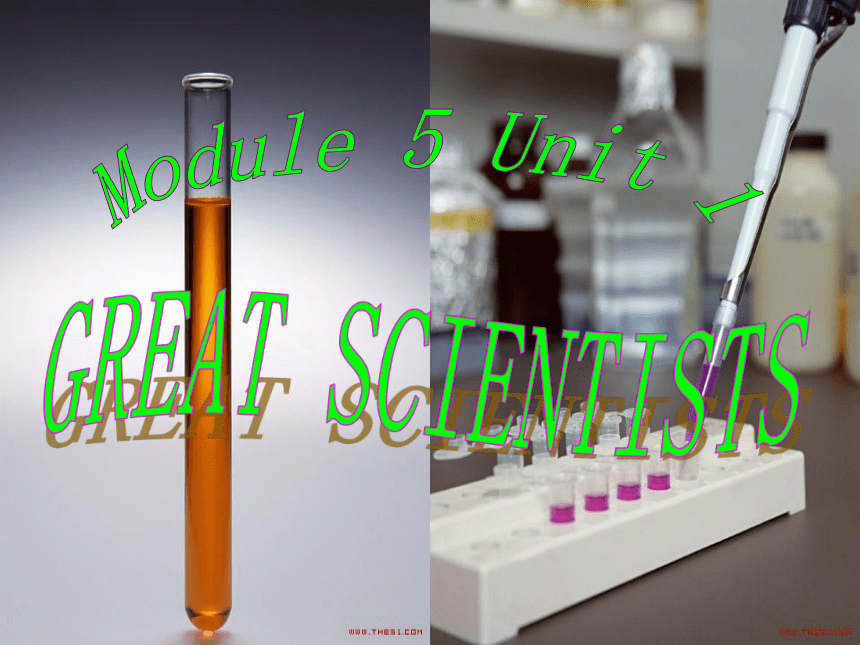 | |
| 格式 | rar | ||
| 文件大小 | 339.6KB | ||
| 资源类型 | 教案 | ||
| 版本资源 | 人教版(新课程标准) | ||
| 科目 | 英语 | ||
| 更新时间 | 2010-08-30 11:16:00 | ||
图片预览

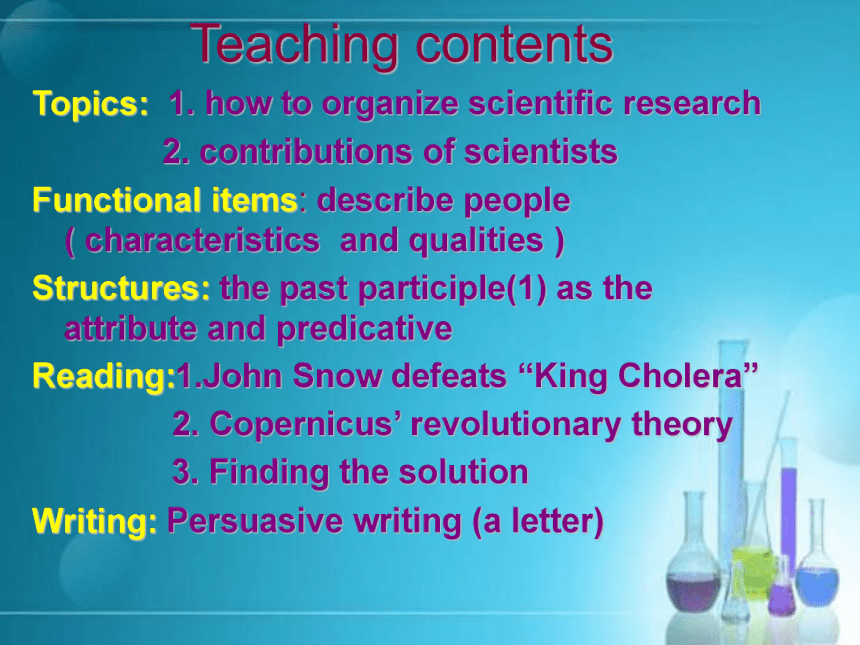
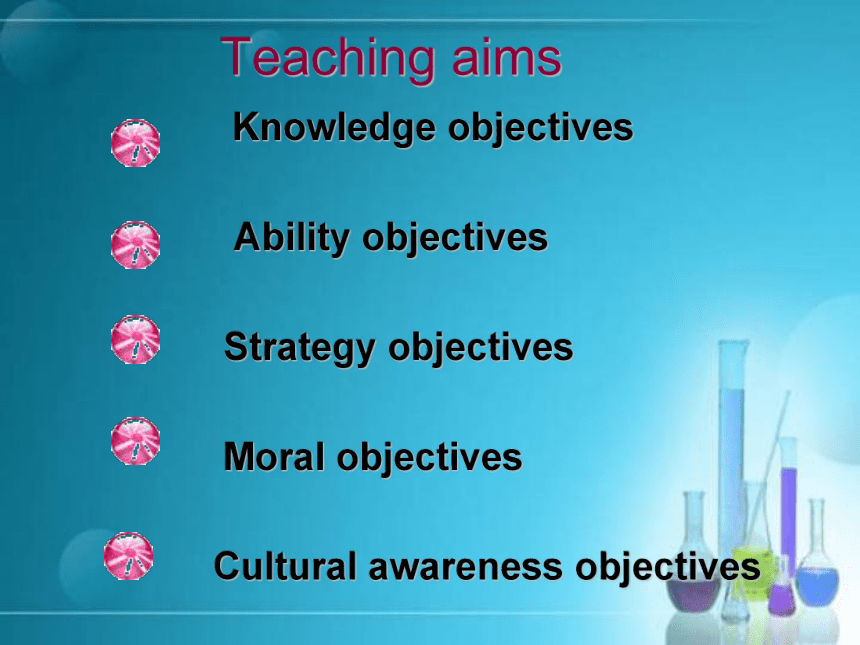
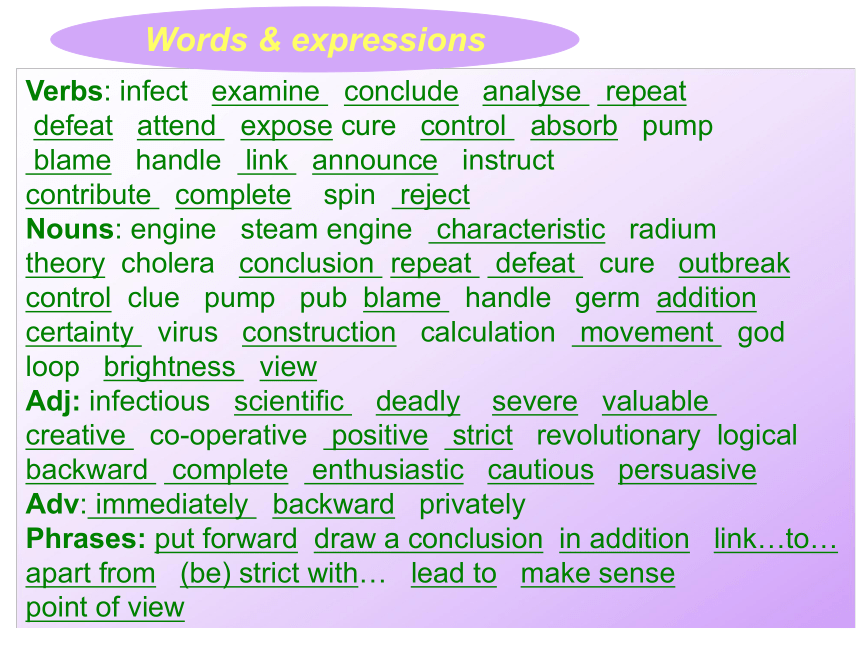
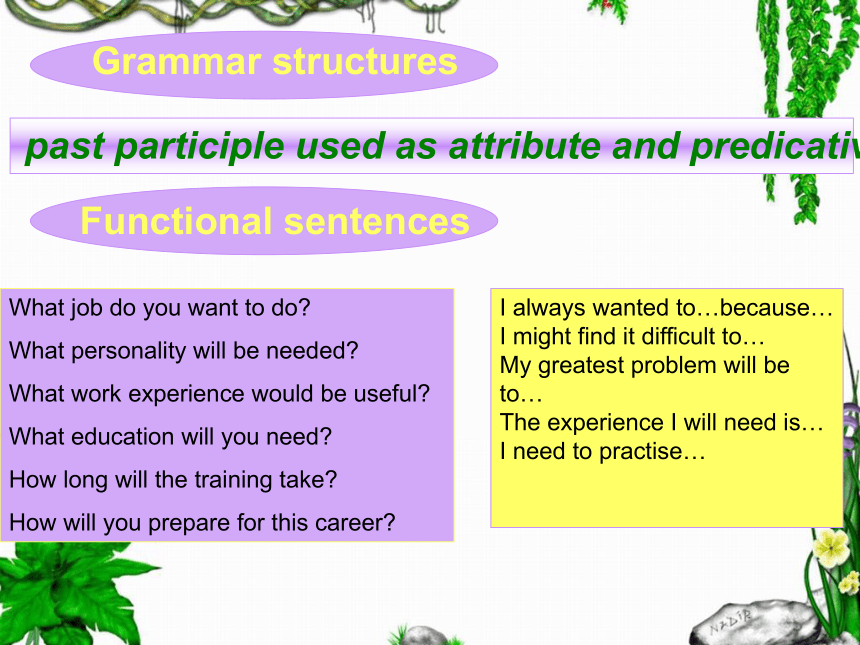
文档简介
课件11张PPT。Module 5 Unit 1GREAT SCIENTISTSTeaching contentsTopics: 1. how to organize scientific research
2. contributions of scientists
Functional items: describe people ( characteristics and qualities )
Structures: the past participle(1) as the attribute and predicative
Reading:1.John Snow defeats “King Cholera”
2. Copernicus’ revolutionary theory
3. Finding the solution
Writing: Persuasive writing (a letter) Teaching aims Knowledge objectives
Ability objectives
Strategy objectives
Moral objectives
Cultural awareness objectives
Verbs: infect examine conclude analyse repeat
defeat attend expose cure control absorb pump
blame handle link announce instruct
contribute complete spin reject
Nouns: engine steam engine characteristic radium
theory cholera conclusion repeat defeat cure outbreak
control clue pump pub blame handle germ addition
certainty virus construction calculation movement god
loop brightness view
Adj: infectious scientific deadly severe valuable
creative co-operative positive strict revolutionary logical
backward complete enthusiastic cautious persuasive
Adv: immediately backward privately
Phrases: put forward draw a conclusion in addition link…to…
apart from (be) strict with… lead to make sense
point of viewWords & expressions past participle used as attribute and predicativeWhat job do you want to do?
What personality will be needed?
What work experience would be useful?
What education will you need?
How long will the training take?
How will you prepare for this career?I always wanted to…because…
I might find it difficult to…
My greatest problem will be to…
The experience I will need is…
I need to practise…
ListeningSpeakingReadingWritingabilities通过两个学生谈论科学家钱学森的故事,使学
生了解科学家的生活经历,并通过回答问题
训练学生的分析、解决问题的能力。通过学生分组讨论将来选择什么科学工作,
需要什么样的教育、品格及经历来完成提问
和应答的交际功能任务训练,同时也实施了
对学生的德育。精读文章是关于英国著名医生John Snow是如何通过考察、分析、探究的科学方法,发现并控制“霍乱”的。泛读文章介绍了哥白尼是如何发现日心说的。通过阅读文章,使学生感悟科学家的周密观察、勇于探索、认真分析的科学精神,使学生了解科学发现的全过程具有其科学的严密性。
针对泛读文章给哥白尼写一封信,表达自己对于他是否应该公布这项发现的观点并阐述理由。培养学生收集信息、并对信息进行思考取舍的能力。同时训练学生“persuasive writing”的写作方法。
Searching
for informationDiscovering
by themselvesPersuasive
communication Harmonious
co-operationstrategy1. Be aware of the advantages and convenience the scientific inventions have brought to us.
2. Be inspired by the great spirit and qualities of these great scientists.
3. Be encouraged to learn from these scientists and make contributions to our society.
4. Learn the scientific ways and procedures of solving a problem.
MoralBroaden students’ horizon
Develop students’ love for
science.Cultural awareness objectivesTeaching arrangementPeriod 1 warming up & VocabularyPeriod 2 Reading Period 3 Learning about languagePeriod 4 GrammarPeriod 5 Listening & SpeakingPeriod 6 Extensive reading
& WritingTHANKS!
2. contributions of scientists
Functional items: describe people ( characteristics and qualities )
Structures: the past participle(1) as the attribute and predicative
Reading:1.John Snow defeats “King Cholera”
2. Copernicus’ revolutionary theory
3. Finding the solution
Writing: Persuasive writing (a letter) Teaching aims Knowledge objectives
Ability objectives
Strategy objectives
Moral objectives
Cultural awareness objectives
Verbs: infect examine conclude analyse repeat
defeat attend expose cure control absorb pump
blame handle link announce instruct
contribute complete spin reject
Nouns: engine steam engine characteristic radium
theory cholera conclusion repeat defeat cure outbreak
control clue pump pub blame handle germ addition
certainty virus construction calculation movement god
loop brightness view
Adj: infectious scientific deadly severe valuable
creative co-operative positive strict revolutionary logical
backward complete enthusiastic cautious persuasive
Adv: immediately backward privately
Phrases: put forward draw a conclusion in addition link…to…
apart from (be) strict with… lead to make sense
point of viewWords & expressions past participle used as attribute and predicativeWhat job do you want to do?
What personality will be needed?
What work experience would be useful?
What education will you need?
How long will the training take?
How will you prepare for this career?I always wanted to…because…
I might find it difficult to…
My greatest problem will be to…
The experience I will need is…
I need to practise…
ListeningSpeakingReadingWritingabilities通过两个学生谈论科学家钱学森的故事,使学
生了解科学家的生活经历,并通过回答问题
训练学生的分析、解决问题的能力。通过学生分组讨论将来选择什么科学工作,
需要什么样的教育、品格及经历来完成提问
和应答的交际功能任务训练,同时也实施了
对学生的德育。精读文章是关于英国著名医生John Snow是如何通过考察、分析、探究的科学方法,发现并控制“霍乱”的。泛读文章介绍了哥白尼是如何发现日心说的。通过阅读文章,使学生感悟科学家的周密观察、勇于探索、认真分析的科学精神,使学生了解科学发现的全过程具有其科学的严密性。
针对泛读文章给哥白尼写一封信,表达自己对于他是否应该公布这项发现的观点并阐述理由。培养学生收集信息、并对信息进行思考取舍的能力。同时训练学生“persuasive writing”的写作方法。
Searching
for informationDiscovering
by themselvesPersuasive
communication Harmonious
co-operationstrategy1. Be aware of the advantages and convenience the scientific inventions have brought to us.
2. Be inspired by the great spirit and qualities of these great scientists.
3. Be encouraged to learn from these scientists and make contributions to our society.
4. Learn the scientific ways and procedures of solving a problem.
MoralBroaden students’ horizon
Develop students’ love for
science.Cultural awareness objectivesTeaching arrangementPeriod 1 warming up & VocabularyPeriod 2 Reading Period 3 Learning about languagePeriod 4 GrammarPeriod 5 Listening & SpeakingPeriod 6 Extensive reading
& WritingTHANKS!
